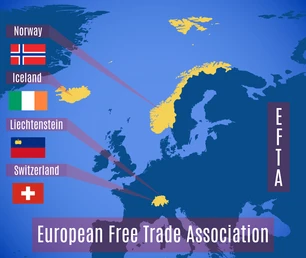International Relations
India and EFTA
- 27 Apr 2023
- 6 min read
For Prelims: European Free Trade Association (EFTA), India's main exports and imports with EFTA, Trade and Economic Partnership Agreement (TEPA)
For Mains: India's strategy for enhancing trade with non-EU countries, India's trade policy and its impact on the economy, India's trade relations with European countries.
Why in News?
In a recent meeting held in New Delhi, India and the four European countries that form the European Free Trade Association (EFTA) have expressed their willingness to resume their negotiations for a Trade and Economic Partnership Agreement (TEPA) that has been stalled since 2018.
- The TEPA aims to boost bilateral trade and economic cooperation between the two regions by reducing tariffs and non-tariff barriers, enhancing market access, and promoting investment flows.
What is EFTA?
- EFTA is an intergovernmental organization that was established in 1960 as an alternative trade bloc for those European states that were unable or unwilling to join the European Union (EU).
- EFTA comprises Iceland, Liechtenstein, Norway, and Switzerland, which are not part of the EU but have access to its single market through various agreements.
- EFTA is India's 9th largest trading partner, accounting for about 2.5% of India's total merchandise trade in 2020-21.
- The main items of India's exports to EFTA are textiles, chemicals, gems, and jewelry, machinery, and pharmaceuticals.
- The main items of India's imports from EFTA are machinery, chemicals, precious metals, and medical instruments.
What is TEPA?
- Objective:
- The TEPA aims to create opportunities for trade and investment between India and EFTA by eliminating/reducing tariffs and non-tariff barriers on a wide range of products.
- It aims to ensure fair and transparent market access conditions for service providers and investors and will enhance cooperation on intellectual property rights protection and enforcement.
- TEPA aims to facilitate trade procedures and customs cooperation along with effective mechanisms for dispute resolution.
- Coverage:
- The TEPA is a comprehensive agreement that covers trade in goods, trade in services, investment, intellectual property rights, competition, government procurement, trade facilitation, trade remedies, dispute settlement, and other areas of mutual interest.
- Recent Highlights:
- Participants acknowledged challenges posed by global economic and trade environment.
- Participants agreed to address bilateral trade and economic partnership issues in a constructive and pragmatic manner.
- India proposed to include talks on gender equality and women empowerment in TEPA negotiations.
- India committed to promote social development along with economic growth.
How are India’s Relations with EFTA Countries?
- India and Switzerland Relations:
- An inter-governmental framework agreement on technical and scientific cooperation was signed, leading to the launch of the Indo-Swiss Joint Research Programme
- Skill training collaboration between both countries is facilitated through institutes such as the Bharatiya Skill Development Campus and University, Indo-Swiss Centre of Excellence in Pune, and the Vocational Training Center in Andhra Pradesh.
- Switzerland is the 12th largest investor in India, accounting for 1.07% of total FDI in India from April 2000 to September 2019.
- India and Norway Relations:
- The India-Norway Task Force on Blue Economy for Sustainable Development was inaugurated in 2020.
- More than 100 Norwegian companies have established themselves in India.
- The Norwegian Pension Fund Global is one of India's largest single foreign investors.
- Academic collaborations exist between the Indian Institute of Technology-Madras and the Institute of Wind Energy in Chennai with institutions in Norway.
- The Norwegian company, Piql, was involved in creating a digital archive for Indian monuments.
- India and Iceland Relations:
- India and Iceland established diplomatic relations in 1972 and have strengthened their ties since 2005 with high-level visits and exchanges.
- India and Iceland share common values of democracy, rule of law, and multilateralism.
- Iceland supports India's candidature for a permanent seat at the UN Security Council.
- India and Iceland cooperate in trade, renewable energy, science and technology, education, culture, and development.
- Several agreements have been signed between the two countries to facilitate economic cooperation, such as a Double Taxation Avoidance Agreement.
- India and Liechtenstein Relations:
- The two countries have friendly relations based on mutual respect and cooperation.
- The bilateral trade between the two countries is modest, amounting to US$ 1.59 million in 2016-17.
- The two countries have exchanged high-level visits to strengthen their ties.
- The two countries have signed agreements to facilitate economic cooperation, such as a Double Taxation Avoidance Agreement.
- Liechtenstein supports India's candidature for a permanent seat at the UNSC.







